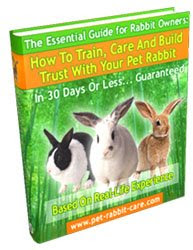One of the top concerns for any pet owner are the diseases that they can get, and how best to prevent them from happening. In this article I'll be talking about common rabbit diseases, signs to watch out for and how to treat them at home.
Colds:
Rabbits can contract colds just like us, and the physical symptoms usually consist of a lot of sneezing, and runny noses. Colds aren't serious, but if you have more than one rabbit you should put the one that's ill in a different cage than the others so it doesn't spread. It will usually last only a few days and clear up on its own.
Coccidiosis:
This disease is contracted by rabbits from licking dirty fur, eating or drinking contaminated food, and is generally caused by poor cage maintenance. This means that it hasn't been cleaned adequately and is one of the most common reasons for premature death in rabbits. Be sure to clean the cage at least once a week.
Symptoms include, diarrhea, sudden weight loss, and your bunny will sit with in a hunched position with their feet forward. Coccidiosis can be treated by introducing a coccidiostat with your rabbits food source. If you feel your rabbit has this disease, make sure you take it to the vet so it can get proper medication.
Red Water:
Red water is reddish urine that is caused by cold temperatures or feeding it too many greens. Move the bunny to a warmer area, and give it plenty of water while lowering the amount of greens he is fed. Keep an eye on him and it should clear up in a couple of days.
Heat Stress:
If your rabbit is lying at full length and panting heavily, chances are good that your bunny is suffering from heat stress. Always keep a bottle of frozen water in your freezer, so that if any of your rabbits show signs of heat stress you can take the bottle and place it near or in the cage to help lower the temperature. It can come on fast which is why it's important to be prepared for it at all times.
Ear Cankers:
Small mites enter your rabbits ear and will cause a crust to appear around the outer edge. If your rabbit is constantly shaking his head or trying to scratch his ear, he may be bothered by mites. You can treat the cankers with any canker lotion to help with discomfort, and be sure to do a full cleaning of its cage so that you can eliminate all mites that are dwelling within.
